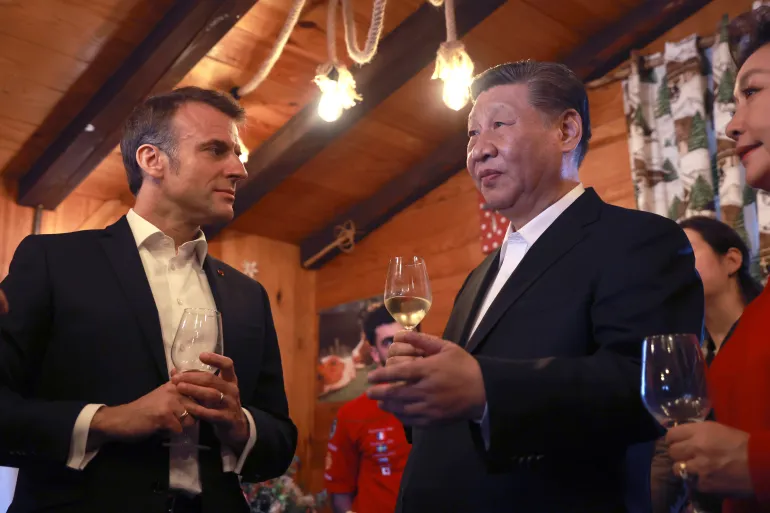By Phaidra Chrysostali,
In early May 2024, the Chinese President Xi Jinping embarked on a significant diplomatic tour across Europe, visiting France, Serbia, and Hungary. This tour marks a critical moment in China-Europe relations, as various geopolitical and economic stakes are involved.
President Xi’s visit to France is seen as a key opportunity for French President Emmanuel Macron to negotiate important trade concessions. Macron is particularly focused on reducing the trade imbalance between France and China. The French President aims to secure better market access for french products and services, especially in the technology and luxury goods sectors. This visit comes amidst broader european concerns about China’s growing economic influence and the need for a more balanced trade relationship.

During the visit, Macron and Xi were expected to discuss several critical issues, including climate change, global security, and the ongoing war in Ukraine. France seeks to position itself as a crucial player in mediating between China and Western powers, especially in the context of the Ukraine conflict. Macron hopes to leverage this visit to enhance France’s diplomatic clout within the European Union and on the global stage.
One of the primary motivations for French President Emmanuel Macron in welcoming Xi is to address the substantial trade imbalance between France and China. France seeks to gain better access to Chinese markets for its products, particularly in sectors where it excels, such as luxury goods, aerospace, and high technology. In addition, Macron aims to secure more favorable terms for french companies operating in China. This includes addressing issues related to market access, intellectual property rights, and regulatory barriers that have traditionally hindered foreign businesses in China. More particularly, France is keen on attracting Chinese investments, particularly in green technology and infrastructure projects. Macron’s administration is likely to highlight opportunities in sustainable development, aiming to align Chinese investments with France’s environmental goals.

For Xi, the visit to France is an opportunity to reinforce China’s strategic interests in Europe. Strengthening ties with a major EU member state like France can help counterbalance the increasing scrutiny and cautious stance of the EU towards China. While France is not a direct participant in the BRI, enhanced economic cooperation can still align with China’s broader objectives under the initiative. Infrastructure and technology partnerships can serve as indirect extensions of the BRI’s goals in Europe.
In Serbia, Xi’s visit underscores the deepening economic and political ties between the two countries. Serbia has been a significant beneficiary of Chinese investment under the Belt and Road Initiative (BRI). Infrastructure projects, such as the modernization of railways and roads, have strengthened Serbia’s strategic position in Southeast Europe. Serbian President, Aleksandar Vučić, views Xi’s visit as a reaffirmation of the strong bilateral relationship and an opportunity to attract further Chinese investment.
Similarly, Hungary stands out as a crucial ally for China within the European Union. Hungarian Prime Minister Viktor Orbán has cultivated a close relationship with Beijing, welcoming Chinese investments in various sectors, including energy, technology, and infrastructure. Hungary’s support for Chinese policies often contrasts with the more critical stance of other EU member states, highlighting the divergent perspectives within the bloc. Xi’s visit to Hungary aims to solidify these ties and explore new avenues for cooperation, especially in light of Hungary’s strategic location and its role as a gateway for Chinese goods into Europe.
Xi’s tour comes at a time when Europe is grappling with its relationship with China. The European Union is increasingly cautious about China’s influence, balancing economic cooperation with concerns over human rights and geopolitical security. Macron’s efforts to secure trade concessions reflect a broader European strategy to engage China while addressing these concerns. Moreover, Xi’s visit to Serbia and Hungary demonstrates China’s intention to deepen its presence in Eastern and Central Europe, regions that are pivotal to the BRI. These visits highlight the varying responses within Europe to China’s growing influence, with some countries embracing closer ties while others advocate for a more guarded approach.
The geopolitical context of Xi’s visit is also significant. The ongoing conflict in Ukraine has strained China’s relations with the West, as Beijing’s stance has often been perceived as sympathetic to Russia. European leaders are keen to engage China in dialogue to ensure a balanced approach to the crisis and to explore potential diplomatic solutions.
In conclusion, Xi Jinping’s visit to France, Serbia, and Hungary represents a multifaceted diplomatic effort to strengthen China’s ties with key European countries. For France, it is a chance to address trade imbalances and enhance its diplomatic role. For Serbia and Hungary, it reaffirms their strategic partnerships with China and the benefits of continued economic cooperation. The visit encapsulates the broader complexities of Europe-China relations, marked by both opportunities for collaboration and underlying tensions that need careful navigation.
References
- China’s Xi Jinping Visits France in First Post-Pandemic Trip to Europe. Washington Post. Available here
- China President Visits France, Serbia and Hungary: What Is at Stake?. Euronews. Available here
- Macron and China’s Xi Break Protocol for One-On-One Visit to the Pyrenees. France 24. Available here




